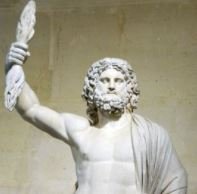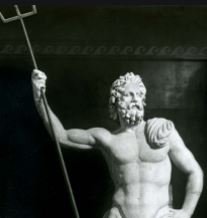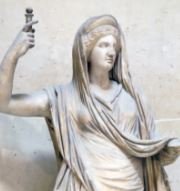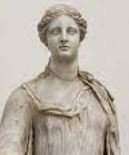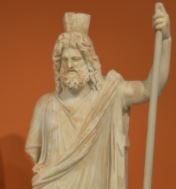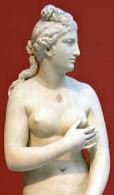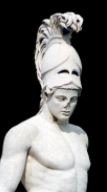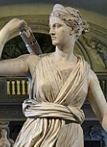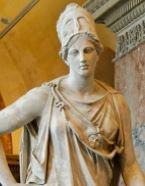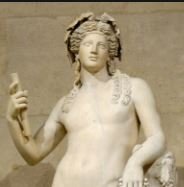The Twelve Olympian Gods and Goddesses: Origin Stories, Myths, Family, Powers, & Symbols
Following the overthrow of Cronus and his titan allies (during the Titanomachy), a new set of gods known as the Olympians assumed the reins of power. The Greek Olympians comprised 12 main deities that were most revered in ancient Greek religion. The names of those powerful Olympians are Zeus, Hera, Poseidon, Demeter, Hades, Hermes, Athena, Ares, Artemis, Aphrodite, Apollo, and Dionysus/ or Hestia.
Those twelve Olympian gods and goddesses made Mt. Olympus their abode, hence their name “Olympians”. With the exclusion of a few Olympian gods like Hades and Poseidon, the remaining Olympian Gods stayed permanently on Mount Olympus. Hades and Poseidon generally spent more time in the Underworld and under the sea respectively.
The article below briefly delves into the origin stories, myths, family tree, powers, and symbols of the twelve Olympian Gods and Goddesses:
Zeus |
Poseidon |
Hera |
Demeter |
Hades |
Aphrodite |
Ares
|
Apollo
|
Artemis |
Athena
|
Hermes |
Dionysus |
Olympian gods and goddesses family tree
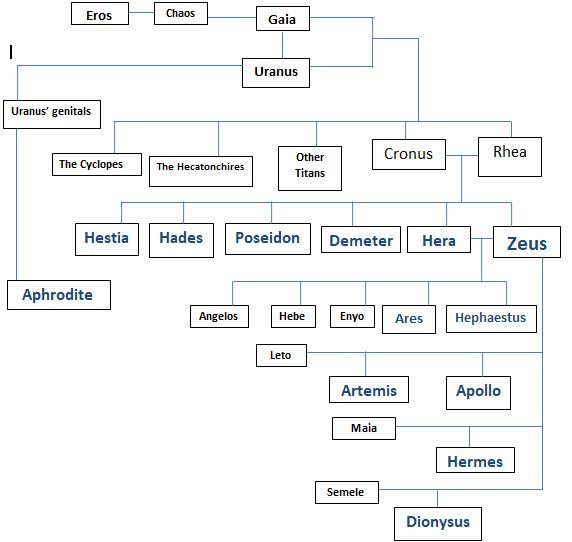
Olympian gods and goddesses | Names in blue are the Olympians; in some cases Hestia, the goddess of the hearth, and Hephaestus, the god of forges and fire, are excluded from the list of Olympian gods and goddesses
Why is Hestia sometimes not included in the list of Olympian gods?

Hestia goddess
It is worth mentioning that Hestia, the goddess of the hearth, was sometimes excluded from the list of Olympian gods. According to the myths, Hestia, the oldest of the Olympian gods, relinquished her seat on Mount Olympus. The peace-loving and benevolent goddess had grown fed up of the power struggle and backbiting among the gods on Mount Olympus. Her seat was given to Zeus’ son, Dionysus, the god of wine.
Other interesting facts about the Olympian gods and goddesses

Olympian gods and goddesses | From top left to right bottom: Zeus, Hera, Poseidon, Hades, Demeter, Aphrodite, Ares, Apollo, Artemis, Athena, Hermes, and Dionysus| The Olympians basically comprise six of the children of the Titans Cronus and Gaia and six of the children of Zeus.
Depending on which account one looks at the story, the list of Olympian gods varies. In some cases, Hades, the god of the Underworld, is not a member of the Olympians because the god spends majority of his time not on Mt. Olympus; instead Hades spends most of his time ruling the world of the dead. In some accounts of the myth, Hephaestus, husband of Aphrodite, does not make the cut.
As a result of those omissions and additions, some ancient writers expanded the list of Olympian gods to fourteen. By so doing, the likes of Hestia, Dionysus, Hephaestus and Tyche (goddess of chance and good fortune) can be included in the list.
The Olympians basically comprise six of the children of the Titans Cronus and Gaia and six of the children of Zeus.
Of all the Olympians, Hermes, the god of trade and commuters, was considered the youngest. The most beloved of the Olympian gods and goddesses was Apollo, the god of light, poetry and medicine. Aphrodite was revered as the most beautiful of all the Greek gods and goddesses, while Ares, the god of war and carnage, was seen as the most violent and destructive.

Greek goddess Tyche was sometimes included in the list of Olympians
